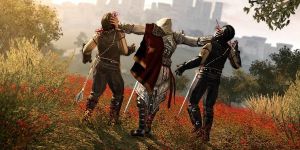Top 10 Historical Inaccuracies: Assassin's Creed

The Assassin's Creed series is perhaps one of the best liked and followed massive world role-playing action-adventure game series to appear in modern gaming and, to be fair, also happens to be one of the most progressive and interesting.
On the subject of fan loyalty, it probably will not shock to learn that when a gamertag has one AC game on it, the chances are incredibly high that it has other games from the series as well - often all of them for the platform. That is not a surprise because the games are both worth playing and rewarding.
Oddly they may offer the first genuine glimpse into history or historical fiction for many players, but as they do, they also may be doing a particular disservice, because while the games are largely historically accurate, they do have flaws - and some of them are glaring flaws...
Among the most disturbing are the historical inaccuracies - of which there are many. But as this is not a Top 100 or Top 50 article, we will just have to restrict ourselves to picking the Top 10. And since we are doing that, we may as well pick the best of the best of them.That may sound odd, but read on - you may be surprised at what you thought was an accurate portrayal in the games!
10. The Assassins Themselves (All)

That's right, we are starting with the Assassin Brotherhood itself, which while it is depicted in all of the games as having always been a worldwide, stealthy, effective death-dealing organization, was in fact a lot smaller and, more to the point, a lot more focused than the game presents.
If you have played the first game in the series you will notice that the Assassins are death on the Templar. That is interesting for a number of reasons, not the least of which being that the actual Assassin Brotherhood (aka Shī‘a Imāmī Ismā'īlī Ṭarīqah of Persia - or perhaps more widely known as the Nizari Ismailis) did not make it a habit to kill Templar.
A Shiite Islamic sect, their primary targets for assassination were actually Sunni Muslim leaders - pay attention here because this is about to get very real, and current.
The Shiite Assassins really did operate out of fort-like towns - in the game Masyaf is pretty accurately depicted and representative of the sort. The thing is - or perhaps it is better stated that the reason is - they operated out of those towns because that was where their religious power bases were.
The Shiite and Sunni sects have been going at each other hammer-and-tong for well over a thousand years - why is anyone's guess and a fitting subject for speculation. We know some of the reasons, but since they have largely been recorded in historical accounts for self-serving purposes (think justification) we cannot really know if they are THE reason.
What we can say with at least a reasonable amount of accuracy is that the Muslims are split into two main branches: the Sunni and Shia.
That split historically originates from a dispute that cropped up very soon after the death of the Prophet Muhammad -- and specifically deals with a disagreement over which was meant to lead the Muslim community. That's right, each thinks that the Prophet meant for THEM to lead.
This is still going on today - and really the why of it does not matter so much for our purposes as the WHAT does. And the what in this case is what the Assassins actually did and who they did it to.
Usually characterized as the secret Brotherhood of Assassins that is led by a mysterious figure known only as the "Old Man of the Mountain," the Nizari Ismailis were in fact a sect that formed in the late 11th century as a result of a schism or split within Ismailism, which was itself a branch of Shia Islam. So it really is rather complicated.
A bloke named Hassan-i Sabbah is widely thought to have founded the Brotherhood -- he certainly led them on raids to capture the mountain strongholds - like Masyaf - that became their homelands.
Within their community was a special type of warrior-acolyte that was known as the Fidai -- who were the actual Assassins that we are talking about when we say Assassins and would be the blokes in the game who ARE the Assassins.
Thanks to the horror stories of the Crusaders and Marco Polo, we know that the Assassins were widely feared - and they may indeed have killed a few Crusaders - or not - but their main targets and the men who they went to great efforts to kill were in fact Sunni leaders, who they viewed as threats to both their way of life and religion.
So yeah, that is one big honking glaring historical inaccuracy right there mates, and it scores first in our list of the Top 10 Historical Inaccuracies of Assassin's Creed!


Pretty off point with some of the French revolution criticism.
For the record there are numerous texts that suggest that Leonardo has a relationship with his assistant. Additionally homosexuality was only coined in recent times, but has been practised since biblical times. did you actually do any historical research or is this article just your personal opinion?
I would like to clear up a misconception written on the first page. Other than a minority number of off sect extremists, like the assasins themselves, Shias have not been known to kill Sunnis. Rather, it was usually the other way around. Also, Shias do not believe they were the ones to lead after the Prophet. Shia means follower and accordingly Shias are the followers of Prophet Mohammad and his family. Shias believe the the rightful heirs to the leadership of the Islamic community belonged to the Prophet's cousin Ali, and his descendants. The Prophet stated and implied many times that Ali will be his successor but the power hungry people ignored the fact that the Prophet himself raised Ali after he was born in the Ka'aba in Mecca, and usurped the leadership of Islam while Ali was busy burying the Prophet after his passing. The Sunnis unfortunately follow those that usurped Ali's power while the Shias follow Ali. Shias view the Prophet and his progeny to be perfect exemplary humans.
the catacombs did exist at that point they were just less extensive the people of paris expanded upon what a previous civilization had expanded on the original catacombs, also the speed and ease of use in ships was something that is explained in the codex they were added by the animus to make it a little easier for the whole thing to happen
Actually, depending on the size of the ship, the guns will be on the main deck due to the fact that there is only 1 deck above the water line, like on the Jackdaw. So in truth, the "gun deck" and the "sail deck" would be on the same deck on a brig (Jackdaw) due to it's size. Same can be said about other ships like sloops, schooners and other ships where there is only 1 deck above the water line.
If you're going to question historical validity in a work, it's only fair to give credible sources in turn. "Significant other is archaeologist/anthropologist" doesn't cut it, particularly for evidence on this "advanced technological society" you talk of.
Ancient Aliens aside, some of your "facts" were incorrect. Example, some pirates were pressed from captured vessels. Bartholomew Roberts, in fact, was dragged into service reluctantly under Howel Davis. Roberts later forced captured officer Henry Glasby into service as navigator. To say it NEVER happened is wrong; that implies we know everything about pirates when we really know very little.
Historical fiction doesn't presume to be 100% accurate. Who wants to spend 45 minutes of gameplay unfurling a sail, or 2 in-game weeks careening? History itself is inaccurate; it relies on storytellers to tell us the "facts". People are unreliable narrators, storytellers moreso. After all, it's always about the best story you can tell.
People think Da Vinci's gay because some court files accusing him of "lieing with a man" are found and very real ._.
In his notebooks there are also some pictures of naked boys and men even more than the amount of naked women
Part of that was social attitudes toward women, too. While growing steadily more progressive toward women having education or women in arts, women posing naked in front of men was improper. Women artists were on the rise, as well, where previously art was strictly a man's job, but were still banned from male nude art model classes, something that's essential in any art training, as well as learning how to paint group pictures. Consequently, most of the nude or semi-nude paintings commissioned depicted religious scenes, which paid quite a bit more.
Many artists just used drawings of corpses, themselves (if they couldn't afford models), each other, or their apprentices, as was the case with Salai. Salai was clearly a favorite subject of many art classes, not just da Vinci's, and although Salai definitely has his share of mysteries and rumors which may or may not have aligned with the Assassin Creed storyline, he was definitely an interesting character if nothing else.
when playing assassin's creed one needs to remember that it's just a game
The only part of this that was't picky was the cannons on the top deck. The point of the game isn't to be exact, Warren Vidic says that what Desmond see's is different because that's how it actually happened.
You have a very rudimentary understanding of history. Being a Professor of world history, I would love a link or reference to your source. Not just for your historical "facts" but more importantly to the empirical evidence of this once great, technologically advanced, extinct society of which refer!
The word bloke came up and I stopped reading
Wow sorry to hear that mate... Where I come from the word is commonly employed to refer to a person of the male gender in casual conversation.
I'm originally from Australia, and while I learned American English as a Second Language at times I do slip up and use real English words. So yeah, sorry mate, didn't realise you were the sort of bloke whose word tolerance is so weak you have physical reactions to words you encounter on web pages.
Glad we got that sorted. You have a great day mate!
Cheers!